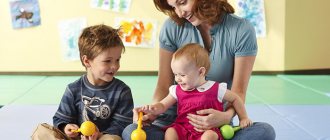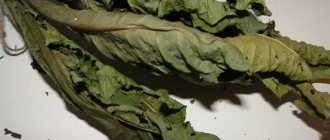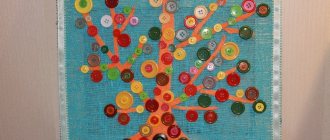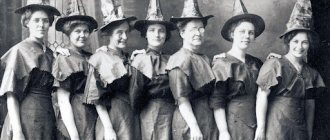Musical repertoire for middle group
Appendix 7
Musical repertoire for middle group
Hearing
"Lullaby", music. A. Grechaninova; "March", music. L. Shulgina, “Oh you. birch", Russian. adv. song; “Mom’s caresses” music. A. Grechaninova; “Music Box” (from “Album of Plays for Children” by G. Sviridov); “The cat got sick”, “The cat got well”, music. A. Grechaninova; “Like ours at the gate”, nar, melody; "Vesnyanka", Ukrainian. adv. song. processing G. Lobachev, lyrics. O..Vysotskaya; "Butterfly", music. E. Griga; "Lark", music. M. Glinka; “New Doll”, “Doll’s Disease” (from “Children’s Album” by P. Tchaikovsky); “Piece” from R. Schumann’s “Album for Youth”; "Children and the Bear" music. E. Tilicheeva, “First Waltz” music. D. Kobalevsky, “Crybaby”, “Crybaby”, “Frolic”, “Stubborn Brother” music. D. Kobalevsky; "Hedgehog" music. D. Kobalevsky, “Falling Leaves” music. T. Popatenko, “Rain” music. N. Lyubarsky, “Sparrows” music. A. Serova, “Bunny” music. M. Starokadomsky, “The Bunny Teases the Teddy Bear” music. D. Kobalevsky, “March of the Rabbits” music. A. Zhilinsky, “Polka” music. M. Glinka, as well as the children’s favorite works that they listened to throughout the year.
singing
Exercises to develop hearing and voice. "Two Grouse", music. M. Shcheglova, lyrics. folk; "Beetle", music. N. Potolovsky, lyrics. folk; "Cuckoo", Russian. adv. song, arrangement I. Arseeva; chants: “Oh, waders! Spring is singing! and “Larks, come”; “Geese”, Russian, Nar. song; "Steam Locomotive" music. V. Karaseva, “We are going” music. E. Tilicheeva, “Birds and Chicks” music. E. Tilicheeva, “Fun Game” by T. Smirnova, “Who Sings Like” music. M. Kartushina; song “Stream”, “We are drawing a snowman” music. etc. ; “Wind and Leaves”, “Wind”, “Frost” music. V. Kartushina, phonopedic exercises by V. Emelyanova (at the choice of the teacher)
Songs. "Bay-bye", music. M. Krasin, lyrics. M. Chernoy; "Autumn", music. I. Kishko, lyrics. T. Volgina; "Kitty", music. V. Vitlina, lyrics. N. Naydenova “Winter has passed”, music. N. Metlova, lyrics. M. Klokova; carols: “Hello”, “Happy New Year”; "Sparrow", music. V. Gerchik, lyrics. A. Cheltsova; "Vesnyanka", Ukrainian. adv. song; "Bunny", music. M. Starokadomsky, lyrics. M. Klokova; "Horse", music. T. Lomovoy, lyrics. M. Evensen; "Steam Locomotive", music. 3. Company, lyrics. O. Vysotskaya, “Autumn” music. I. Kishko, lyrics. T. Volchina; "Autumn" music. T. Vikhareva, lyrics. T. Volchina; "Rain" music. etc. E. Moshantseva; "Song of Friends" music. V. Gerchka, lyrics. Y. Akima; "Hello, Santa Claus" music. V. Semenov, lyrics. L. Dymova; round dance "Hello, Christmas tree!" music etc. S. Nasaumenko; "Happy Geese" Ukrainian Nar. song; “Song about Grandma” music. V. Ivannikova, lyrics. O. Fadeeva; “We sang a song” muses. R. Rustamova, lyrics. L. Mironova; "About frogs and mosquito" music. A. Filippenko, lyrics. T. Volchina; “Autumn has come” lyrics. and music S. Nasaaumenko; "Yablonka" Russian. adv. Song; “Chizhik Sang a Song” music by L. Ibryaev, lyrics by S. Vetrova
musical rhythmic movements
Game exercises. “Springs” under Russian. adv. melody; walking to "March", music. I. Berkovich; “Funny balls” (bouncing and running), music. M. Satulina; jumping in English adv. the melody "Polly"; easy running under latv. "Polka", music. A. Zhilinsky; "March", music. E. Tilicheeva; “A bear walks” to the music. “Etude” by K. Czerny; jumping to the music “Polka”, music. M. Glinka; "Riders", music. B. Vitlina; let's stomp, circle around in Russian. adv. melodies. "Rooster", music. T. Lomovoy; "Doll", music. M. Starokadomsky; “Beetles”, Hungarian. adv. melody, arrangement L. Vishkareva; "March" music Lomovoy; “Jumping” of muses by A. Shulgin; "Spring" Russian. Nar melody, arr. T. Lomovoy; “Exercises with flowers” music. W. Mozart; “Round dance step” russian melody, arr. T. Lomovoy;
RHYTHMIC SKETCHES FOR THE DEVELOPMENT OF COORDINATION OF MOVEMENT AND WORD:
"Sparrow" A. Filippenko, “Drops” by M. Kartushin; dance “Crows” by M. Kartushina; “Icicles”, “The cold was coming”, “Bunnies and palms”, “Ducklings”, “Hedgehog”, “Wolf”, “Day and Night”, “The cat is playing the violin” by M. Kartushin
Round dances and round dances. “Dance of the Larami”, Latvian, Nar. melody; “Top and Clap”, music. T. Nazarova-Medtner, lyrics. E. Karganova; “Show your palms”, lat. adv. melody “Dance with Spoons” to Russian. adv. melody; “Dance with handkerchiefs”, Russian. adv. melody; “Invitation”, Ukrainian. adv. melody, arrangement G. Teplitsky; “Dance with the Sultans”, Ukrainian. adv. melody, arrangement M. Rauchwerger; “Who is our good guy?”, music. An. Alexandrova, lyrics. folk; “Show your palm”, Latvian, adv. melody; Dance "Goodbye", Czech. adv. melody; “Handkerchief”, Russian. adv. melody in arrangement L. Revutsky; “Clap-clap-clap”, z. adv. melody, arrangement A. Roomer; “We went to the meadow” music by A. Filippenko, lyrics by T. Volchina; New Year's round dances at the choice of the musical director.
Characteristic dances. "Snowflakes", music. O. Bertha, arr. N. Metlova; "Petrushka's Dance", music. A. Serov from the opera Rogneda (excerpt); “Dance of the Hare” from “Polka” by J. Strauss; "Snowflakes", music. T. Lomovoy; repetition of dances learned during the year, as well as dramatizations and musical games: “Kitten-slayers”, music. E. Tilicheeva, lyrics. M. Evensen; “Matryoshka” by T. Shutenko, lyrics. N. Kufko; “Dance of the Stars” by V. Chadarev’s muses; “Dance of the Snowmen” by Stepanova’s muses; “Wind and Leaves” lyrics. and music E. Skripkina, any plot dances at the discretion of the teacher
Music games
Games. “The Hen and the Cockerel”, music. G. Frida; "Blind Man's Bluff", music. F. Flotova; “The Bear and the Hare”, music. V. Rebikova; "Planes", music. M. Magidenko; “Game of Santa Claus with snowballs”, music. P. Tchaikovsky from the ballet “The Sleeping Beauty”); "Blind Man's Bluff", music. F. Flotova. "Funny Balls", music. M. Satulina; “Find yourself a mate”, music. T. Lomovoy; “Occupy the House”, music, M. Magidenko; “Who is more likely to take a toy?”, Latv. adv. melody; "Merry Carousel", Russian. adv. melody, arrangement E. Tilicheeva; “Traps”, Russian. adv. melody, arrangement A. Sidelnikova; games learned during the year.
Singing games. “Garden round dance”, music. B, Mozhzhevelova, lyrics. I, Passovoy; “Doll”, music, Starokadomsky, lyrics. O. Vysotskaya; "Santa Claus and Children", music. I. Kishko, lyrics. M. Evensen; "Zainka", music. M. Kraseva, lyrics. L. Nekrasova; “Bunny, come out”, “Geese, swans and wolf”, music. E. Tilicheeva, lyrics. M. Bulatova; “We went to the meadow”, music. A. Filippenko, lyrics. N. Kuklovskaya; “Fish”, music, M. Kraseva. “Handkerchief”, Ukrainian. adv. song, arr. N. Metlova; "Cheerful girl Tanya", music. A. Filippenko, lyrics. N. Kuklovskaya and R. Borisova, “At the Bear in the Forest” Russian folk game; “Like our Frost...” russian melody, arr. V. Stepanova
Song creativity
"What is your name?"; “What do you want, kitty”; "March", music. N. Bogoslovsky; “Bear”, “Bull”, “Horse”, music. A. Grechaninova, lyrics. A. Barto; “Our song is simple”, music. An. Alexandrova, lyrics. M. Evensen; “Rabushechka Hen”, music. G. Lobachev, lyrics. folk; “Kitten-Kitten”, Russian. adv. song.
Development of dance and gaming creativity
"Horse", music. N. Potolovsky; “Bunnies”, “Hen and Chicks”. "Sparrow", music. T. Lomovoy; "Doll", music. M. Starokadomsky; “Jumping along the path”, music. A. Filippenko; come up with the Petrushka dance to the music “Petrushka” by I. Brahms; "Bear Cubs", music. M. Kraseva, lyrics. N. Frenkel.
musical educational games
Development of pitch hearing. “Birds and Chicks”, “Swing”.
Development of rhythmic hearing. “Cockerel, hen and chick”, “Kts how is it going?”, “Merry pipes”, “Play like me”.
Development of timbre and dynamic hearing. “Loud-quiet”, “Find out your instrument”, “Guess what I’m playing.”
Genre identification and memory development. “What is the doll doing?”, “Find out and sing the song from the picture”
Playing children's musical instruments. “Accordion”, “Blue Sky”, “Andrew the Sparrow”, music. E. Tilicheeva, lyrics. M. Dolinova; “Soroka-soroka”, Russian. adv. joke, arr. T. Popatenkos “Drip-drip-drip...”, Romanian, People. song, arr. T. Popatenko; "Fox", Russian. Nar joke, arr. V. Popova
Approximate musical repertoire for the senior group
Hearing
"March", music. D. Shostakovich; “Lullaby”, “Guy with an accordion”, music. G. Sviridova; "Falling Leaves", music. T. Popatenko, lyrics. E. Avdienko; “Autumn Song” (from the cycle “Seasons” by P. Tchaikovsky); "Mom's Holiday", music. E. Tilicheeva, lyrics. L. Rumarchuk; “My Russia”, music. G. Struve, lyrics. N. Solovyova; "Children's polka", music. M. Glinka; "Music", music. G. Struve; "Lark", music. M. Glinka; "Moth", music. S. Maikapara; “Bird Dance”, “Lullaby”, music. N. Rimsky-Korsakov;
singing
Exercises to develop hearing and voice. "Andrey the Sparrow", Russian. adv. song, arr. Yu. Slonova; "Drum", music. E. Tilicheeva, lyrics. N. Naydenova; “Cloud”, nickname; "Lullaby", music. E. Tilicheeva, lyrics. N. Naydenova; rus. adv. songs and chants; "Pea" music. V. Karaseva, lyrics. N. Frenkel; “Echo” of muses by E. Tilicheeva; “The cat has a coo” Russian nar song; “The locomotive is going, going” by the muses of T. Ernesaks; “The Bug and the Cat” is a Czech folk joke; phonopedic exercises: “Spring Voices”, “Autumn”, “Machine”, “Leaf”, “Mushroom - Mushroom”
Songs. “Guests have come to us,” music. An. Alexandrova, lyrics. M. Evensen; "Blue Sled", music. M. Jordansky, lyrics. M. Klokova; "Chicken", music. E. Tilicheeva, lyrics. M. Dolinova; "Lily of the Valley", music. M. Kraseva, lyrics. N. Frenkel; "Spring Song", music. A. Filippenko, lyrics. G Boyko; “Yap-yap”, music. In Gerchik, lyrics. Y. Razumovsky, “Skvorushka” of muses and lyrics by S. Nasaumenko; “Gather the Harvest” music by L. Filippenko, lyrics by T. Volchina; “Golden Autumn” of muses and lyrics by M. Sidorova; “Conversation” of muses and lyrics by O. Druzhinina; “Breeze”, “Sun” by the muses of L. Guseva; “Song about an octopus”, “Spring begins” by the muses of L. Guseva; "Hello, Christmas tree" music. S. Nasaumenko; “Good Soldiers” by A. Filippenko, lyrics by T. Volchina; “Eternal Flame” by A. Filippenko, lyrics. Yu. Chibisova; "Antoshka" music. V. Shainsky, lyrics. Yu. Entina; “Winter Gifts” lyrics. and music S. Nasaumenko
Song creativity
“Lullaby”, Russian. adv. song; “Come up with a song”; nursery rhymes, teasers, counting rhymes and other Russian ones. adv. Popevki; “Finish the song”, “Say hello with a song” lyrics. and music M. Kochetova
musical rhythmic movements
Exercises. "Little March", music. T. Lomovoy; "Spring", music. E. Gnessina (“Etude”); "Step and Run", music. N. Nadenenko; “Smooth hands”, music. R. Gliere (“Waltz”, fragment); “Who Jumps Better”, music. T. Lomova: “Learn to dance in Russian!”, music. L. Vishkareva (variations on the Russian folk melody “From under the oak, from under the elm”); “Walking of a different character” by the muses of T. Lomova; “Let's drown - let's circle” Russian. adv. Melody; "Turntables" Ukrainian Nar melody, arr. Y. Stepovoy; variations in Russian adv. Melody “From - under the oak, from - under the elm”
Exercises with objects. "Waltz", music. A. Dvorak; “Exercises with ribbons”, Ukrainian. adv. melody, arr. R. Rustamova; “Passing a handkerchief”, music. T. Lomovoy;
Sketches. "Polka", German. adv. dance; "Aw!" (“Game in the Forest”, music by T. Lomova).
Dancing and dancing. "Friendly couples", music. I. Strauss (“Polka”); rus. adv. melody "Len", arr. M. Rauchwerger; "Fun Dance", music. V. Zolotareva; "Circular Dance", Russian. adv. melody, arr., S. Razorenova; "Russian Dance", Russian. adv. melody (“Whether in the garden or in the vegetable garden”); “Quadrille with spoons”, Russian. adv. melody, arr. E. Tumanyan; Boys' dance "Chebotukha", Russian. adv. melody.
Characteristic dances. “Matryoshka”, music. B. Mokrousova; "Chebotukha", Russian. adv. melody, arrangement V. Zolotareva; "Dance of the Beads", music. T. Lomovoy; “Dance of Parsley”, Croatian, Nar. melody; "Flappers", music. N. Kiesel-Vatter; "Dance of the Snow Maiden and Snowflakes", music. R Gliera; "Dance of the Dwarves", music. F. Churchel; "Dance of the Buffoons", music. N. Rimsky-Korsakov;
Round dances. “Guests have come to us,” music. An. Alexandrova, lyrics. M, Evensen; “Harvest”, music. A. Filippenko, lyrics. O. Volgina; "New Year's round dance", music. S. Shaidar; "New Year's round dance", music. T. Popatenko; “The New Year is Coming to Us”, music. V. Gerchik, lyrics. 3. Petrova; “Oh yes birch tree”, music. T. Popatenko, lyrics. Zh. Agadzhanova; “Near the river, near the bridge”; “The young woman went for water”, Russian. adv. songs, arr. V, Agafonnikova.
Music games
Games. “Trap”, music. J. Haydn; “We won’t let you out”, music. T. Lomovoy; “Be clever!”, music. N. Ladukhina; “Game with a tambourine”, music. M. Kraseva; “Look for a toy”, “Be clever”, Russian. adv. melody, arr. V. Agafonnikova; “Pilots at the airfield”, music. M. Rauchwerger; “Find yourself a partner”, Latv. melody, arrangement T. Popatenko; "Cat and Mice", music. T. Lomovoy; "Rattles", music. T. Vilkoreiskaya;
Singing games. "Zainka", Russian. adv. song, arr. N. Rimsky-Korsakov; “Like thin ice”, Russian. adv. song, arrangement A. Scar; "Raven", Russian. adv. melody, arr. E. Tilicheeva; "Vaska the Cat", music. G. Lobachev, lyrics. N. Frenkel; "Hedgehog", music. A. Averina; “Round dance in the forest”, music. M. Iordansky; "Trap" Russian adv. Melody, arr. L. Sidelnikova; “Raven” russian joke, arr. E. Tilicheeva; "Chizhenka" Russian nar game; “Mushrooms” by M. Bystrova; “We will run away from the wind” by muses T. Bokach; “Autumn walked around the garden” by N. Karavaeva
Musical and didactic games
Development of pitch hearing. “Steps”, “Mom and kids”.
Development of the sense of ri, “Rhythmic stripes”, “Learn to dance”; “Ri; "Musical Stompers"
Development of timbre hearing. “What do I play?”, “Musical riddles”, “Musical house”.
Development of diatonic hearing. “Loudly, quietly binge drinking”, “Ringing bells”.
Development of music perception and musical memory. “Be Attentive”, “Buratino”, “Music Store”, “Seasons”, “Our Songs”.
dramatizations and musical performances
“Guests have come to us,” music. An. Alexandrova; “Like ours at the gate”, Russian. adv. melody, arr. V, Agafonnikova; “Where have you been, Ivanushka?”, Russian. adv. melody, arr., M. Jordansky;
Development of dance and gaming creativity
“Cat and Goat”, “I will water, I will water onions”, music. E. Tilicheeva; "Waltz of the Cat", music. V. Zolotareva; free dancing to any dance tunes in an audio recording; “Burn, burn clearly!”, Russian. adv. melody, arr. R. Rustamova; “And I’m in the meadow”, Russian. adv. melody, arr. T. Smirnova; “Playing Snowballs” by T. Lomova; “The wind plays with leaves” by A. Zhilin
Playing children's musical instruments
“The Blue Sky”, “Brave Pilot”, music. E. Tilicheeva, lyrics. M. Dolinova; "Don-don", Russian. adv. song, arr., R, Rustamova; “Burn, burn clearly!”, Russian. adv. melody; "The Shepherd", Czech. adv. melody, arr. I. Berkovich; "Cockerel", Russian. adv. song, arr. M. Kraseva
Approximate musical repertoire for a preparatory school group
hearing
"March", music. S. Prokofiev; “Doll’s illness”, “Doll’s funeral”, “New doll”, “Kamarinskaya”, music. P. Tchaikovsky; "The Cheerful Peasant", music. R. Schumann; “Autumn” (from the cycle “The Seasons” by A. Vivaldi); “October” (from the cycle “Seasons” by P. Tchaikovsky); “Sea”, “Squirrel”, music. N. Rimsky-Korsakov (from the opera “The Tale of Tsar Saltan”); “Italian polka”, music. S. Rachmaninov; “Sabre Dance”, music. A. Khachaturyan; “Winter has come”, “Troika”, music. G. Sviridova; “Waltz-joke”, “Gavotte”, “Polka”. "Dance", music. D. Shostakovich; “Winter” from the cycle “The Seasons” by A. Vivaldi; “In the Cave of the Mountain King” (suite from music to G. Ibsen’s drama “Peer Gynt”), “Procession of the Dwarves”, op. 54 E. Grieg; "Song of the Lark", music. P. Tchaikovsky; "Dance of the Birds", music. N. Rimsky-Korsakov (from the opera “The Snow Maiden”); "Dawn on the Moscow River", music. M. Mussorgsky (introduction to the opera “Khovanshchina”); “Spring” from the cycle “The Seasons” by A. Vivaldi; Organ Toccata in D minor I.-S. Bach; “Minuet” from the children’s album “Spinikins” by S. Maykapar: “Chamomile Rus'”, other works by Russian and Western European composers can be performed (at the choice of the music director); “September” (from the cycle “Seasons” by P. Tchaikovsky); “In Autumn” S. Maykopar; “In Autumn” by I. Cui; “Musical Moment” by F. Schubert; “Nanny's Tales”, “Baba Yaga” by P. Tchaikovsky; “Fairy Tale” by S. Prokofiev; “The Hut on Chicken Legs” by M. Mussorgsky; “Winter” by I. Cui; “Tambourine” by J. Rameau; “Thinking” by S. Maikopar; “The moon walks over the meadows” S. Prokofiev
Singing
Exercises to develop hearing and voice. “A fox walked through the forest”, Russian. adv. song; “A bunny walks in the garden”, Russian. adv. melodies; “Bunny”, “Parsley”, music. V. Karaseva; “Cat-cat”, “Lullaby”, “Pea”, music. V. Karaseva; "Swing", music. E. Tilicheeva, lyrics. M. Dolinova; “There will be a slide in the yard”, music. T. Popatenko, lyrics. E. Avdienko; "Winter Song", music. M. Kraseva, lyrics. S. Vysheslavtseva; "Christmas tree", music. E. Tilicheeva, lyrics. E, Shmanova; “The New Year is Coming to Us”, music. V. Gerchik, lyrics. 3. Petrova; "Mom's Holiday", music. Yu. Guryeva, lyrics. S. Vigdorova; “The best”, music. V. Ivannikova, lyrics. O. Fadeeva; "New Year's round dance", music. T. Popatenko; "It's Mother's Day", music. Yu. Tugarinova; “New Year’s round dance”, music. S. Schneider; “Song about Grandma”, “Brother Soldier”, music. M. Partskhaladze; “Spring has come”, music. 3. Levina, lyrics. L. Nekrasova; "Vesnyanka", Ukrainian. adv. song, arr. G. Lobacheva; “There was a birch tree in the field”, Russian. adv. song, arr. N. Rimsky-Korsakov; “Goodbye, kindergarten”, music. Yu. Slonova, lyrics. V. Malkova; “We are now students,” music. G. Struve; "Victory Holiday", music. M. Partskhaladze; "Summer Flowers", music. E. Tilicheeva, lyrics. L. Nekrasova; “How our girlfriends went”, Russian. adv. song; “On the bridge”, music. A. Filippenko; “Who invented the song”, music. D. Kompaneitsa; “We will collect leaves” by the muses of A. Gavrilova; “Leap - hop - hop” by Guseva’s muses; “Autumn Chants” by T. Sidoorov; “Echo” by E. Poplyanov; phonopedic chants at the teacher's choice
Exercises to develop coordination of speech and movement: “Spikelets” by M. Kartushin; “The Departure of Birds”, “About the Bear” by D. Kobalevsky; “Airplane” by L. Gusev; “We are walking” by Z. Repin, V. Buiko
Songs:
“Picking mushrooms” by the muses of A. Selezneva, lyrics. N. Vetrovoy; “A Drop of Rain” music and lyrics by M. Bystrova; "Leopold's Song" music. B. Savelyeva, lyrics. Hoyt; “Near the Christmas tree” music. M. Parkhaladze, lyrics. Z. Petrova; “What is New Year?” music Yu. Chichkova, lyrics. M. Plyatskovsky; "New Year" music. T. Smirnova, lyrics. A. Granevskaya; "Sleigh" music A. Filippenko; "Cranes" music. G. Vikhareva, lyrics. P. Volsky; "Good hedgehog" music. Pine; "Forest Song" music. Yu. Chichkova; "Spring" music. T. Volchina; “Victory will come” lyrics and music. M. Sidorova; "Cart" music. A. Linkova, lyrics. M. Plyatskovsky; "Victory Day" music. T. Chudovoy, lyrics. T. Ladonshchikova; “If there were no schools” music. V. Shainsky, lyrics. Yu. Entina; songs dedicated to the holiday “Graduation to school” at the discretion of the teacher
song creativity
"In Autumn", music. G. Singer; “Merry song”, music. G. Struve, lyrics. V. Viktorova; “Sad song”, music. G. Struve; "Dancing", music. T. Lomovoy; "In Spring", music. G. Singer; “Quiet song”, “Loud song”, music. G. Struve; “Slow song”, “Fast song”, music. G. Struve.
Musical and rhythmic movements
Exercises. "March", music. I. Kishko; walking with a cheerful and calm step to “March”, music. M. Robert; “Running”, “Colored flags”, music. E. Tilicheva; “Who jumps better?”, “Running”, music. T. Lomovoy; “Girls and boys are walking, music. V. Zolotareva; “Raise and cross the flags” (“Etude”, music by K. Guritta). “Who jumps better?”, “Running”, music. T. Lomovoy; "Brave Rider", music. R. Schumann;
“Exercise with ribbons”, music. W. Mozart; “Let’s stomp and twirl”; “Ah, the street, the street is wide”, Russian. adv. melody, arr. T. Lomovoy; “Rinse handkerchiefs”: “Oh, meadow duck”, Russian. adv. melody, arr. T. Lomovoy; “Exercise with flowers”, music. T. Lomovoy; “Exercise with flags”, German. adv. dance tune; “Exercise with a ribbon” (Swedish folk melody, arrangement by L. Vishkarev); “Exercise with tape” (“Game”, music by I. Kishko).
Sketches. “We’ll dance” (“Lamb”, Russian folk melody); “Rain” (“Rain”, music by N. Lyubarsky); “Horses” (“Dance”, music by Darondo); “Offended”, music. M, Stepanenko; “Bears are dancing”, music. M. Kraseva. Show the direction (“March”, music by D. Kabalevsky); each couple dances in their own way (“Oh, you, birch,” Russian folk melody); “Jumper”, “Stubborn”, music. G. Sviridova; "Frogs and Storks", music. V. Vitlina; "Dance of the Butterflies", music. E. Tilicheeva.
Dancing and dancing. “Pair dance”, Karelian. adv. melody; “Circular gallop”, Hungarian. adv. melody; "Spring", music. Y. Chichkova (“Polka”); “Pair dance”, Latvian, nar. melody; "Polka", music. V. Kosenko. "Waltz", music. E. Makarova; "Polka", music. P. Tchaikovsky; "Minuet", music. S. Maikapara; "Waltz", music. G. Bachman; “Heels”, Russian. adv. melody, arr. E. Adler: “Spinning Spinning”, Russian. adv. melody, arr. T. Lomovoy; “Russian Dance with Spoons”, “And I’m in the Meadow”, “Polyanka”, Russian. adv. melodies; “The girls sowed flax”, Russian. adv. songs; “Sudarushka”, Russian. nar, melody, arr. Yu. Slonova; “Quadrille with spoons”, Russian. adv. melody, arr. E, Tumanyan. "Dancing", music. T. Lomovoy; "Dance with Umbrellas" music. M. Legrand; “The bird danced a polka” from the film. "The Adventures of Pinocchio" music. A. Rybnikova; “Dance of the Dolls and the Teddy Bear” music. D. Kobalevsky
Character dances
Round dances. “Will I go out to the river”, Russian. nar, song, arr. V. Ivannikova; “There’s a viburnum on the mountain”, Russian. adv. melody, arr. A. Novikova; "Winter Holiday", music. M. Starokadomsky; "On New Year's Eve", music. E. Zaritskaya: “The New Year is coming to us,” music. V. Gerchik, lyrics. 3. Petrova; “There was a birch tree in the field”, Russian. adv. song, arr. N. Rimsky-Korsakov; “Is it in the garden? in the garden", Russian. adv. melody, arr. I. Arseeva; “Oh yes. birch" music T. Popatenko
Music games
Games. “Take the flag”, “Find yourself a partner”, Hungarian. adv. melodies; “Hares and Fox”, “Cat and Mice”, music. T. Lomovoy; “Who is faster?”, music. M. Schwartz; “The Shepherd and the Little Goats”, Russian. adv. song, arr. V. Trutovsky; “Pleten” russian melody, arr. S. Bodrenkova
Singing games. “Recognize by voice”, music. V. Rebikova (“The Play”); “Look”, music. T. Lomovoy; “Like thin ice”, Russian. adv. song. “The girls were sowing”, arr. I. Kishko; "Shadow-Shadow", music. V. Kalinnikova; “I walk with the loach”, Russian. adv. song, arr. A. Grechaninova; “Like on a small bridge”, “Like ours at the gate”, “Kamarinskaya”, arr. A. Bykanova; "Crane", Ukrainian. adv. song; "Game with flags", music. Yu. Chichkova; “Dudar”, “Chizhenka”, “Zainka” Russian nar game;
Musical and didactic games
Development of pitch hearing. “The Three Little Pigs”, “Think, Guess”, “There are different sounds”, “Funny parsleys”.
Development of the sense of ri, “Complete the task,” “Identify by rhythm.”
Development of timbre hearing. “Guess what I’m playing”, “The story of a musical instrument”, “Musical house”.
Development of diatonic hearing. “Loudly - quietly binge drinking”, “Ringing bells, look for them.”
Development of music perception. “In the Meadow”, “Song - Dance - March”, “Seasons”, “Our Favorite Works”.
Development of musical memory. “Name the composer”, “Guess the song”, “Repeat the melody”, “Recognize the work”.
Dramatizations and musical performances
“Like ours at the gate”, Russian. adv. melody, arr. V. Agafonnikova; “Like on thin ice”, Russian. adv. song; “On the Green Meadow”, Russian. adv. melody; “We will marry a mosquito”, “I walk with a loach”, Russian. adv. songs, arr. V. Agafonnikova; “New Year's Ball”, “Under the Shadow of Friendly Muses”, “Cinderella”, author. T. Koreneva. “The Tsokotuha Fly” (opera-play based on the fairy tale by K. Chukovsky), music. M. Kraseva.
Development of dance and gaming creativity
“Dance of the Bear and Cubs” (“Bear”, music by G. Galinin); “I’m already pulling the pegs”, Russian. adv. song, arr. E. Tilicheva; “I’m walking down the street”, Russian. adv. song, arr. ; "Winter Holiday", music. M. Starokadomsky; "Waltz", music. E. Makarova; "Two Roosters", music. S. Razorenova; “The dolls came out to dance”, music. V. Vitlina; "Polka", Latv. adv. melody, arr. A. Zhilinsky; “Russian Dance”, Russian. adv. song, arr. K. Volkova;
playing children's musical instruments
“Jingle Bells”, “To School” and “Accordion”, music by E. Tilicheeva, lyrics. M. Dolinova; "Andrey the Sparrow", Russian. adv. song, arr. E. Tilicheeva; "Our Orchestra", music. E. Tilicheeva, lyrics. Yu. Ostrovsky; “Latvian Polka”, arr. M.-Rauchwerger; “On the green meadow”, “In the garden, in the vegetable garden”, “Magpie-magpie”, Russian. adv. melodies; “Squirrel” (excerpt from the opera “The Tale of Tsar Saltan”, music by N. Rimsky-Korsakov); "Raven", Russian. adv. joke, arr. E. Tilicheeva; “I was walking up the hill”, “There was a birch tree in the field”, Russian. adv. songs; “Oh, the hoop broke,” Ukrainian. adv. melody, arr. I. Berkovich; “Guests have come to us,” music. An. Alexandrova; "Waltz", music. E. Tilicheeva; “In our orchestra”, music. T. Popatenko.
Get text
Author: Svetlana Evgenievna Bulanova, music director
Institution: MDOAU "Kindergarten No. 63 in Orsk" Locality: Orsk
Goal: Creating conditions for the development of the creative qualities of a preschool child through musical and play activities. Objectives: 1. Educational: - To reinforce in children the correct and rhythmic execution of movements: easily jump on their toes, perform light running in all directions, distinguish two-part forms and independently change movements on them, perform various movements with their hands, convey images in motion. — Teach children to convey the character of the song in singing, to sing in a drawn-out, calm, natural voice; perform breathing exercises correctly, develop the articulatory apparatus; develop memory and intonation expressiveness. - Encourage the development of elements of musical literacy: distinguish between short and long sounds, name a graphic representation of sounds, clap the rhythmic pattern of a song, determine the direction of movement of the melody; correctly name and clap rhythmic pictures, play sequentially. — Determine the nature of music, distinguish characteristic music, come up with the simplest plots, select illustrations (including poetic ones) for the musical works listened to, motivate your choice. 2. Developmental: - promote the development of a sense of rhythm in children; - develop pitch hearing; - develop emotional responsiveness to music; — develop creative imagination and the ability to find associative connections; - encourage self-expression in different types of musical activities; - activate children's vocabulary. — develop communication skills. 3. Educational: - to cultivate in children aesthetic taste and love of music; — instill in children a culture of performing movements, singing and listening to music; — to introduce children to world musical culture, to help expand their musical horizons; - develop a friendly attitude towards each other and towards adults. Planned result: - Children have developed the ability to move in accordance with the tempo, rhythm and nature of the music, and the range of movements has been expanded. — Pupils have mastered the basics of musical literacy: distinguish the direction of movement of a melody, recognize long and short sounds. — Children control their voice: they sing calmly, without tension, and perform breathing exercises correctly. — Children are emotionally responsive to music and can establish associative connections with it. — Preschoolers are active, proactive, and creatively carry out the tasks given to them. — Children have developed a culture of listening to music, singing, and performing movements. Age of children: This educational music activity is intended for children 4-5 years old. Equipment: chairs according to the number of children, piano, stereo system, multimedia installation, laptop, USB device, wall screen, thread snowballs with written tasks, snowflakes for the game “Snowflakes Fly”, bench with musical instruments: metallophone (1 pc.), candy wrappers (3 pcs.), as well as bags (3 pcs.), wooden spoons (6 pcs.), triangles (3 pcs.), maracas (2 pcs.), pipes (3 pcs.), rattles. The decoration of the hall is like a winter fairy tale. List of audio resources: recording of the play “Father Frost” by R. Schumann, phonogram for the dance “Polka” by A. Spadavecchia, accompaniment to the game “Balls” by M. Satulina. List of electronic resources: screensaver “Winter Forest”, picture “Winter Forest”, video on the content of ri, fairy tale-noisemaker “Winter in the Forest”. Progress of the event. The multimedia screen shows a winter screensaver. Children enter the hall freely. Progress of the lesson Music by A. Vivaldi “Winter” sounds for 2 hours. Children enter the hall and stand in a circle. Musical director. It was invented by someone simply and wisely: When meeting, greet: “Good morning!” Good morning to the sun and birds. Good morning to smiling faces. And everyone becomes Kind, trusting... Let the good morning last until the evening. Musical director. I said hello to you. Will you say hello to me? And with our guests? Children. Yes! The musical greeting “The bright sun is shining through our window” sounds. Musical director. I suggest you find a partner and greet each other with a song. The valeology chant “Good morning!” Musical director. Guys, where is this letter from, let's read what it says! I have a lot of things to do - I cover the whole earth with a white blanket, I clean up the ice of the river, I whitewash fields and houses, And my name is... (Winter) Musical director. To meet me, follow the path into the forest. There you will find my snowballs. Just know that they are not simple, but magical. Complete all tasks: Dance, sing and play! Musical director. Then I invite you to go with me to a real winter fairy tale! Our path lies through a magical forest. Shall we go? Children. Yes! Musical director. We are going on skis into the forest, We are climbing a hill, The poles will help us walk, The road will be easy for us. Let's run along the path and reach the forest. Musical director. Hold hands and make a perfect circle. Put your hands down. Now close your eyes and turn around yourself. (Magic music sounds). Musical director. Open your eyes... It turns out that the forest is very beautiful in winter, but very cold, right guys? Let's warm up a little? Musical and rhythmic exercise “Balls” music by M. Satulina. Musical director. And here are the magical snowballs that winter told us about! We get the first snowball, what task has winter prepared for us? 1st snowball. Listen carefully to the music and tell us what its character is, remember its name. Listening to music “Father Frost” by R. Schumann (Children's answers) Music director. How many parts are there in the work? What instruments perform it? I’ll read a poem, and you think, does it fit this music?
E. Tarakhovskaya He grew to my eyebrows, He climbed into my felt boots. They say he is Santa Claus, and he plays pranks like a little boy. He ruined the water tap in our washbasin. They say he has a beard and plays pranks like a little boy. He draws Palm trees, stars, skiffs on glass. They say he's a hundred years old, but he plays pranks like a little boy! Musical director. But is this poem suitable? And why? N. Nekrasov It is not the wind that rages over the forest, It is not the streams that run from the mountains, Frost the voivode patrols his domain. He looks to see if the blizzards have covered the forest paths well, and are there any cracks or crevices, and is there any bare ground? Are the tops of the pines fluffy, Are the patterns on the oaks beautiful? And are the ice floes firmly bound in the great and small waters? He walks - walks through the trees, crackles on the frozen water, and the bright sun plays in his shaggy beard... Musical director. I suggest you, to the music, depict how an angry Santa Claus stomps his foot and knocks with his ice staff. And in the middle part, when the music becomes alarming and mysterious, we will show how Santa Claus casts a spell, freezes everything around him, and takes a blizzard and a blizzard out of his bag! Musical director. What do you think is the most beautiful thing in the winter forest? Children. Big trees, snowdrifts, snow, icy rivers. Musical director. But it seems to me that there is nothing more beautiful than snowflakes! (Draws attention to the snowball). 2nd snowball. Look at the snowflakes and catch them quickly! Ri development exercise
(Video). Look how different they are, silvery, needle-like, magical. Draws children's attention to the snowflakes lying on the table. Breathing exercise “Snowflakes, fly!” 3rd snowball. Sing songs, don't yawn. Look, don't yawn! Prepare your voice so that it is thin and high! Guys, let's sit down on the stumps and play. Musical director. We found ourselves in a magical forest; we had never been here before. This forest is full of sounds, there are a lot of miracles here. How quiet it is in the forest, it must really be magical. Hear, the breeze flew over the tops - “oooooooo” The woodpecker knocks on the tree “knock-knock-knock” (clicking with tongue). The wind blew strongly, a snowstorm begins (showing a glissando from the bottom up). Cloud sighed “ah-ah” (showing low and high sounds with her hand and voice). Snowflakes flew (different intonation with vowel sounds). The trees rustled and whispered (sh-sh-sh). Suddenly everything calmed down and there was silence. (ch-ch-ch) Speech game with sounding gestures “Snow” by O. Arsenevskaya Playful phonopedic exercise “Let’s Warm Up” by O. Arsenevskaya Our palms are freezing in the wind, We’ll warm them up a little. Children warm their palms silently and with the voice “A-a-a.” Remember how we roll down the hill with our voice? Singing “Winter Fun” by M. Kartushina. I'll go up the hill and jump on a sled. I'm standing on a hill, singing a song loudly. Well, since our voice is ready, we need to sing a beautiful song!
Song “Winter Gifts” S. Nasaulenko Singing of the 1st verse. Conversation about the content: mode, character of the music.
Okay, but there are some difficult parts in the song where the melody goes up and down. Listen to this phrase. (Sing, accompanied by showing your hand). Let's try to sing it again. Now let's sing the song again. Try to be attentive and enter on time.
Musical director. Well done, we did a great job. But what is the task in the next snowball? 4th snowball. Take your tools and tell a story together! Musical director. Guys, take the musical instruments that you would like to play today. I will read you a fairy tale, and you will voice its characters using musical instruments. What instruments are suitable for voicing fairy tale characters? (Children's answers)
Noisy fairy tale “Winter in the Forest” (Video). 5th snowball. You guys, don't get bored, start dancing together! Dance “Polka” A. Spadavecchia Musical director. Guys, look, we have the last snowball left! 6th snowball. Come in a circle, guys, and have fun! Communication game “Snow, ice, chaos!” Children sing a song and dance in a circle, then look for a mate and freeze their “elbows”, “backs”, “knees”, “palms”. “Zimushka” appears on the screen. Musical director. You guys are great, you completed all the tasks! You are friendly, active, attentive and very musical, and Zimushka wants to give you these magical snowballs! Musical director. And it's time for us to return. Hold hands and make a perfect circle. Put your hands down. Now close your eyes and turn around yourself. The music of magic sounds. Musical director. Open your eyes. Here we are in kindergarten. Tell me, did you like it in the winter forest? Who did you meet there? What interesting things did you see or learn? What was the most difficult thing? What do you remember most? Did you like listening to the sounds of the forest? Who liked catching snowflakes? How about pretending to be an angry Santa Claus while listening to music? How about composing a fairy tale yourself, using musical instruments? Musical director. It's time to say goodbye. The children and the teacher sing the song “Goodbye!” The children leave the hall to the music.
You can download materials for informational purposes only, all
The rights to the materials on the site belong to their authors.






